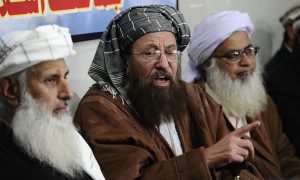Newspaper Article 26/01/2014

Pakistan has been suffering from terrorism since 2001. Soon after former president Pervez Musharraf decided to ally with the US in its war against terrorism, Pakistan turned into a front-line state in that war.
Over the years, the country’s internal security situation has deteriorated, and it took the law enforcement agencies years to learn to cope with the new threat.
Official figures show that more than 49,000 civilians and 3,500 military personnel have lost their lives in terrorist attacks and combat. The number may be higher, and the economy has suffered huge losses.
The government of Prime Minister Muhammad Nawaz Sharif has announced its policy of negotiating with the Taliban. The big question is why Sharif has decided to talk to the militants who have caused so much damage to our society, economy, and security.
The simple answer is probably that Sharif believes in the policy of dialogue and reconciliation. In his previous government, he was successful in bringing the then prime minister of India Atal Bihari Vajpayee to Pakistan, and both countries signed the Lahore Declaration which paved the way for further bilateral confidence building.
However, later on with the change of governments in both countries, India reversed the process, but Pakistan still believes in having good neighborly relations with India. Sharif is back in office and the process has restarted.
The government’s policy is not only focused on dialogue. The overall policy is to deal with militants through all means. If the militants refuse to cooperate and carry on terrorizing people and harming national interests, they will be dealt with using an iron fist.
To comprehend the Taliban phenomenon in the northern areas, one has to see the whole picture. The Federally Administrated Tribal Areas of Pakistan have remained a de facto autonomous region since the country’s independence.
There was minimal government interference in that region until recent times. The tribal lords controlled those areas and were cooperative toward governments.
All was well until Pakistan allied with the US. External hands fueled the fire by assisting anti-government Islamist elements which turned against Pakistan.
A military operation to clear the area of militants is a huge task, and there is a chance of collateral damage as well. There are people among the militants who are tired of militancy and have realized that they are being used by the religious leaders in the name of Islam to achieve political gains.
Such people are looking for an opportunity to break away from the militants. The dialogue offers them an opportunity in this regard.
Second, the option for an operation to eliminate militants is always there with the government, and there have been success stories in the past when the government launched operations in Swat and South Waziristan, clearing the areas of militants. The offer will benefit people who want to live a peaceful life.
The Tahreek-e-Taliban Pakistan (TTP) has refused the government’s offers for dialogue. Mullah Fazlullah has replaced Hakimullah Mehsud as leader of the TTP after he was killed in a drone strike in November last year.
The TTP spokesman Shahidullah Shahid has rejected talks with the government and said the TTP is determined to avenge the killing of Mehsud.
The important question in this situation is what are the future scenarios? Most analysts believe that there is little chance of the TTP leadership cooperating, however some factions of the TTP and other organizations may take up the government offer.
The government needs to set a timeline for the militants to lay down their arms and negotiate while preparations for a military operation to clear those areas of terrorists can be decided.
Both the people and government want to see a secure country, and the negotiation is seen as a step in that direction.
Source: Global Times, January 26, 2014
Disclaimer: Views are of the writer and do not necessarily reflect policy of IPRI.
